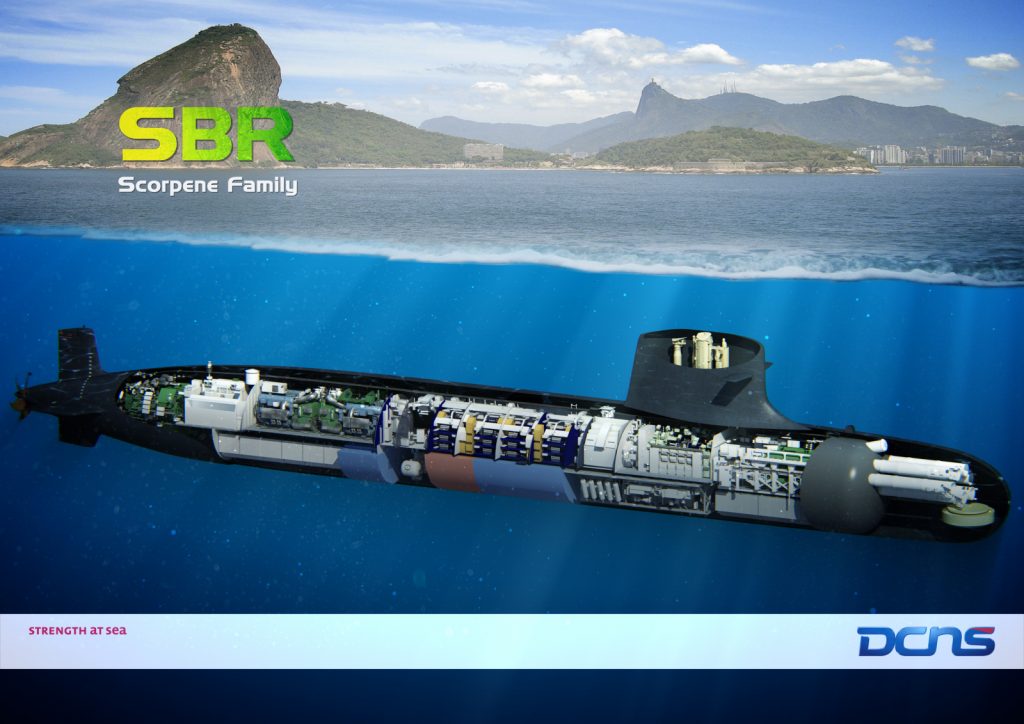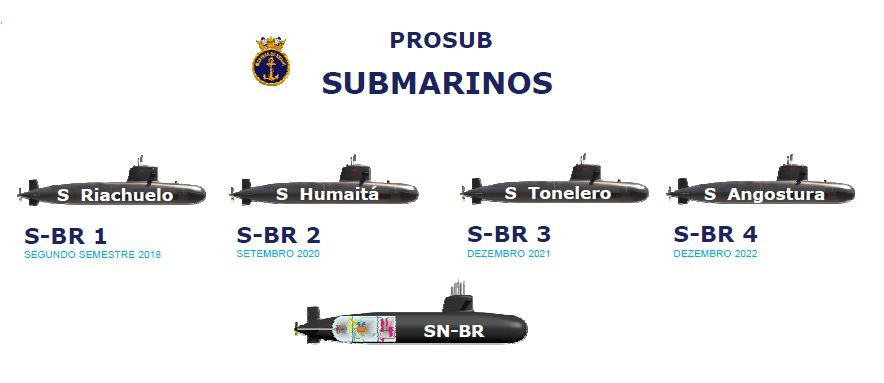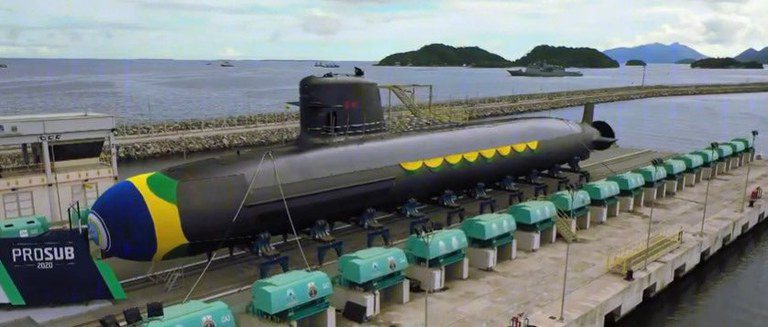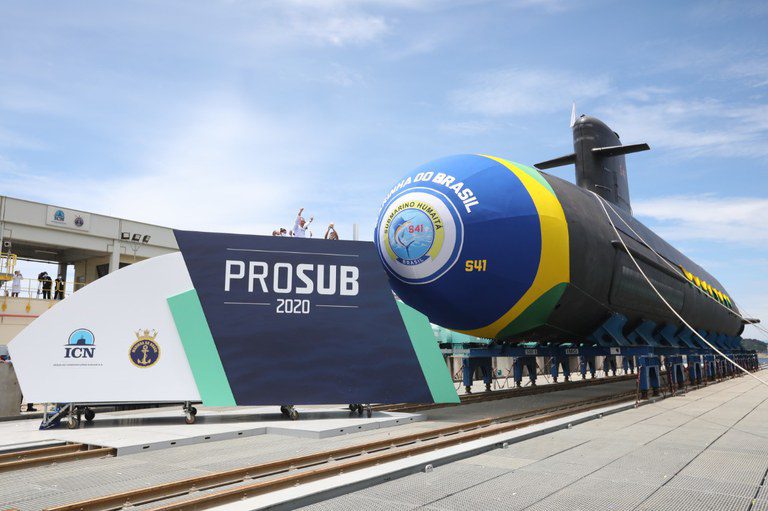Article originally published on FSP – Clipped by Defesanet
Brazil is negotiating with France to complement the agreement for the construction of the Conventional Nuclear Propulsion Submarine (SCPN).
On September 22, the French Chief of Staff, Brigadier Fabien Mandon, was in Brasilia and took part in a meeting with Admiral Petrônio Aguiar, the Navy’s Director General for Nuclear Development, to discuss the terms of the contract and make progress on the construction of the submarine, which is facing delays.
The meeting, which was attended by members of Itamaraty, the Planalto and the French General Secretariat for Defence (Nota DefesaNet – probably the General Delegation for Armaments – DGA), the body that authorizes the sale of the country’s armaments and sensitive technology, was kept confidential. Admiral Petrônio will travel to France in the coming days to continue the talks.
France and Brazil are negotiating within the framework of the strategic partnership agreement signed in 2008, which includes PROSUB, the “Submarine Development Program”. Estimated at R$40 billion at current values, PROSUB envisaged the construction of four conventional submarines (two of which are ready) and a conventional nuclear-powered submarine, named “Álvaro Alberto”.
The agreement signed in 2008 with France included “long-term French support for the design and construction of the non-nuclear part of the submarine”. In practice, until now, it has been support for the design of the nuclear-powered submarine’s hull – but not the technology to accommodate the reactor (which Brazil knows how to manufacture) inside the hull and make it connect and supply energy for propulsion.
Although the submarine is a priority for the Brazilian government, the project is progressing slowly because Brazil needs more know-how and equipment from France and because the budget is inconsistent. In this complementary agreement, Brazil is negotiating to buy from the French equipment for the turbine and generator, which would use the energy generated by the reactor, and are not manufactured in the country.
The country also needs the transfer of know-how to integrate the reactor into the submarine and to finalize the submarine’s prototype at the Laboratório de Geração de Energia Nucleoelétrica (LABGEN), in Iperó, in the interior of São Paulo. The Navy also needs training for assembly and coordination, operational tests and industrial rationalization to reduce construction costs.
Another of Brazil’s demands is help to guarantee the safety of the reactor inside the submarine, but this faces resistance from the French side, which doesn’t want to get directly involved in the nuclear part.
The aim would be to reach a letter of intent signed by President Lula and French leader Emmanuel Macron in the coming months.
The Brazilian Navy intends to move forward with the negotiations in order to meet its internal timetable, which foresees the completion of the atomic reactor in 2027 and the completion of the submarine in ten years’ time.

The obstacles to the agreement with France and the negotiations with international atomic energy agencies have led the Navy to treat the PROSUB negotiations with more secrecy since August.
It is estimated that around R$25 billion will be needed for this new phase, between equipment purchases from France and Brazilian investment. The Brazilian government is negotiating the amounts.
“This new negotiation will determine how France will support the continued construction of the nuclear-powered submarine, how much it will cost and whether they will extend the agreement,” says Admiral Antonio Ruy Silva, a member of USP’s International Conjuncture Analysis Group (Gacint).
Brazilian and French authorities had already talked about the issue in May in France and in June at Lula’s meeting with Macron in Paris.
The negotiations are delicate because the United States is opposed to selling the equipment and transferring the know-how to Brazil. “The United States doesn’t want another power in the Western Hemisphere to have this war capability,” says Francisco Carlos Teixeira, professor of contemporary history at the Federal University of Rio de Janeiro (UFRJ).
Today, only the five permanent members of the UN Security Council – the United States, China, Russia, France and the United Kingdom – and India, which is not a signatory to the Nuclear Non-Proliferation Treaty (NPT), have this technology. They all have atomic bombs.
A geopolitical bust may play into the French’s calculations when deciding whether to sign the new agreement with Brazil. In 2021, Australia canceled a $66 billion contract with France to buy a fleet of conventional submarines and announced that it would instead purchase nuclear-powered submarines from the United States and the United Kingdom.
President Macron was taken aback and became enraged. In March of this year, the US, UK and Australia formalized the so-called AUKUS agreement, with a view to containing China.
“It could be time for France to return the blow it took from the US,” says Teixeira. “It would also mean important orders for French industry, which has suffered from the loss of contracts with Australia.”
A report by the French Senate in July states that the development of the Álvaro Alberto “represents a major challenge for Brazil” and that “several interlocutors clearly indicated that they wanted greater support from France”.
The report recommends studying the possibility of “deepening the PROSUB program in the nuclear area”, bearing in mind that “the AUKUS agreement (Australia – United Kingdon – United States) should lead to the construction and delivery by the United States and England of 3 nuclear-powered submarines to Australia”.
The French interest in the sale, besides being financial, is also to get closer to Brazil and eventually have the country as a new supplier of uranium. France, which buys 20% of its uranium from Niger, wants to diversify its sources, given that the African country has had a coup d’état and is heavily influenced by Russia.

Macron, with the gas supply crisis due to the war in Ukraine, has announced the construction of new nuclear power plants, which will greatly increase demand for the mineral.
It would take Brazil around three years to increase production, and it would have to change the legislation – currently a state monopoly. But there is already a strong lobby for this.
Congressman Júlio Lopes (PP-RJ), president of the Parliamentary Front for Nuclear Technology and Activities in Congress, is one of the biggest advocates of adopting small modular reactors and increasing uranium production in the country. “The French government is very interested in Brazilian uranium,” he said.
In addition to the technological challenges, Brazil faces another obstacle for the nuclear submarine: it will have to negotiate a safeguards agreement with the IAEA (International Atomic Energy Agency) to guarantee the safety of the atomic fuel – enriched uranium.
The agency has already expressed resistance. Australia is also negotiating safeguards, but unlike Brazil, it has adhered to the additional protocols of the Nuclear Non-Proliferation Treaty. The Brazilian government sees the additional protocols as excessive and as interfering with sovereignty.
When contacted by the report, the Navy sent a note stating that “the strategic partnership with France has been successful over the last 15 years” and that the Force “remains committed to its maintenance and even its growth, thus generating greater synergy and development for both nations”.
The Navy said it was seeking, within the scope of PROSUB, to increase the quantity of peripheral equipment for the future submarine’s propulsion system”. “These are special materials that are not yet available on the national market and, therefore, the participation of our French industrial partners would be interesting.”
The French Embassy in Brazil declined to comment.
Brazil is developing its own nuclear-powered submarine

The Submarine Development Program (PROSUB) is one of the main strategic projects of the Brazilian Armed Forces and aims to increase the national defense structure and ensure Brazilian maritime sovereignty.
The program strengthens the national industrial sector, increasing its strategic importance to the economic development of Brazil. To date, it generated 4000 jobs and integrates the Metallic Structures Manufacturing Unit, the Shipyards, the Radiological Complex, & the Naval Base.
Besides four conventional submarines, the goal is to build the first nuclear submarine in the Southern Hemisphere. Today, nuclear submarines are only operated by the US, Russia, China, the UK and France – with which Brazil has partnered to develop its own nuclear submarine.
